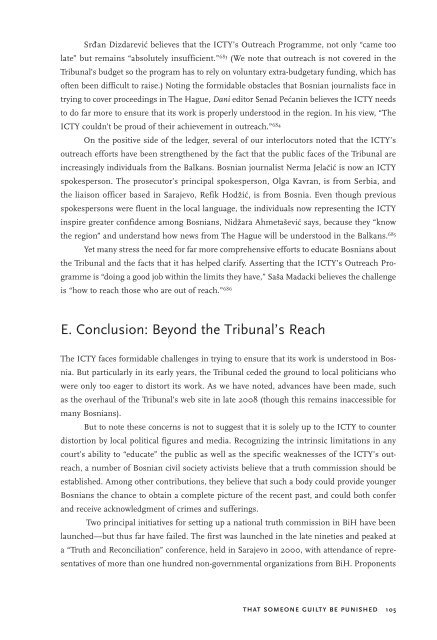That Someone Guilty Be Punished - International Center for ...
That Someone Guilty Be Punished - International Center for ...
That Someone Guilty Be Punished - International Center for ...
You also want an ePaper? Increase the reach of your titles
YUMPU automatically turns print PDFs into web optimized ePapers that Google loves.
Srd¯an Dizdarević believes that the ICTY’s Outreach Programme, not only “came too<br />
late” but remains “absolutely insufficient.” 683 (We note that outreach is not covered in the<br />
Tribunal’s budget so the program has to rely on voluntary extra-budgetary funding, which has<br />
often been difficult to raise.) Noting the <strong>for</strong>midable obstacles that Bosnian journalists face in<br />
trying to cover proceedings in The Hague, Dani editor Senad Pećanin believes the ICTY needs<br />
to do far more to ensure that its work is properly understood in the region. In his view, “The<br />
ICTY couldn’t be proud of their achievement in outreach.” 684<br />
On the positive side of the ledger, several of our interlocutors noted that the ICTY’s<br />
outreach ef<strong>for</strong>ts have been strengthened by the fact that the public faces of the Tribunal are<br />
increasingly individuals from the Balkans. Bosnian journalist Nerma Jelačić is now an ICTY<br />
spokesperson. The prosecutor’s principal spokesperson, Olga Kavran, is from Serbia, and<br />
the liaison officer based in Sarajevo, Refik Hodžić, is from Bosnia. Even though previous<br />
spokespersons were fluent in the local language, the individuals now representing the ICTY<br />
inspire greater confidence among Bosnians, Nidžara Ahmetašević says, because they “know<br />
the region” and understand how news from The Hague will be understood in the Balkans. 685<br />
Yet many stress the need <strong>for</strong> far more comprehensive ef<strong>for</strong>ts to educate Bosnians about<br />
the Tribunal and the facts that it has helped clarify. Asserting that the ICTY’s Outreach Programme<br />
is “doing a good job within the limits they have,” Saša Madacki believes the challenge<br />
is “how to reach those who are out of reach.” 686<br />
E. Conclusion: <strong>Be</strong>yond the Tribunal’s Reach<br />
The ICTY faces <strong>for</strong>midable challenges in trying to ensure that its work is understood in Bosnia.<br />
But particularly in its early years, the Tribunal ceded the ground to local politicians who<br />
were only too eager to distort its work. As we have noted, advances have been made, such<br />
as the overhaul of the Tribunal’s web site in late 2008 (though this remains inaccessible <strong>for</strong><br />
many Bosnians).<br />
But to note these concerns is not to suggest that it is solely up to the ICTY to counter<br />
distortion by local political figures and media. Recognizing the intrinsic limitations in any<br />
court’s ability to “educate” the public as well as the specific weaknesses of the ICTY’s outreach,<br />
a number of Bosnian civil society activists believe that a truth commission should be<br />
established. Among other contributions, they believe that such a body could provide younger<br />
Bosnians the chance to obtain a complete picture of the recent past, and could both confer<br />
and receive acknowledgment of crimes and sufferings.<br />
Two principal initiatives <strong>for</strong> setting up a national truth commission in BiH have been<br />
launched—but thus far have failed. The first was launched in the late nineties and peaked at<br />
a “Truth and Reconciliation” conference, held in Sarajevo in 2000, with attendance of representatives<br />
of more than one hundred non-governmental organizations from BiH. Proponents<br />
THAT SOMEONE GUILTY BE PUNISHED 105

















